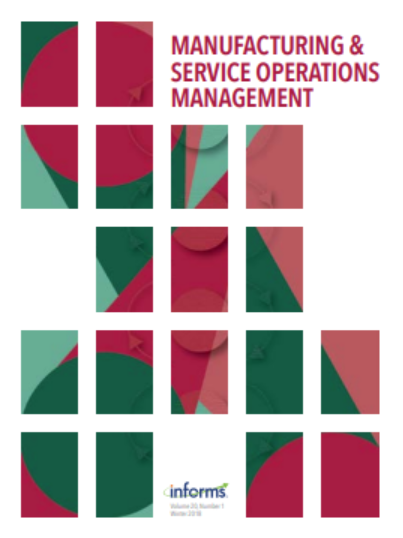诊断不确定性下的接纳控制偏差与路径依赖反馈
IF 4.8
3区 管理学
Q1 MANAGEMENT
M&som-Manufacturing & Service Operations Management
Pub Date : 2023-08-10
DOI:10.1287/msom.2021.0194
引用次数: 0
摘要
问题定义:在病人诊断不确定的情况下,在随机到达和住院时间的情况下,医生在做出入院控制决策时是否表现出可预测的行为偏差?我们如何组织反馈来帮助他们改进决策?方法/结果:我们使用行为模型来理论化诊断锚定和调整不足启发式如何导致过度配给偏差,并假设这种偏差何时最大。然后,我们提出,对被拒绝患者的反馈——高于对入院患者的反馈——对于减轻这种偏见至关重要。这是因为仅针对住院患者的反馈可能会产生一种路径依赖,使决策者无法接收到最有帮助的否定反馈。我们通过预先注册的实验提供了支持这些假设的证据,在这些实验中,医学院学生、亚马逊机械土耳其工人或多产工人管理模拟医院单位的入院情况。管理意义:我们的研究结果(1)阐明了诊断不确定性下入院控制中的重要锚定偏差,(2)确定被拒绝的患者反馈是减轻这种偏差的关键组成部分,(3)提供了对这些现象可能最显著的情况的见解。基金资助:本工作由韩国政府(MSIT)资助的韩国国家研究基金会(NRF)资助[grant 2022R1F1A1076045]。补充材料:在线附录可在https://doi.org/10.1287/msom.2021.0194上获得。本文章由计算机程序翻译,如有差异,请以英文原文为准。
Admission Control Bias and Path-Dependent Feedback Under Diagnosis Uncertainty
Problem definition: Do physicians exhibit predictable behavioral bias when making admission control decisions under patient diagnosis uncertainty with stochastic arrivals and lengths of stay? How can we structure feedback to help improve their decision making? Methodology/results: We use a behavioral model to theorize how a diagnosis anchoring and insufficient adjustment heuristic may lead to an over-rationing bias, and we hypothesize when this bias is greatest. We then propose that feedback for rejected patients—above and beyond feedback for admitted patients—is critical for mitigating this bias. This is because feedback for only admitted patients may suffer from a type of path dependency that prevents decision makers from receiving the most helpful disconfirming feedback. We provide evidence supporting these hypotheses using preregistered experiments in which medical students, Amazon Mechanical Turk workers, or Prolific workers manage admissions for simulated hospital units. Managerial implications: Our results (1) illuminate an important anchoring bias in admission control under diagnosis uncertainty, (2) identify rejected-patient feedback as a critical component for mitigating this bias, and (3) provide insight into the circumstances under which these phenomena are likely to be most significant. Funding: This work was supported by the National Research Foundation of Korea (NRF) grant funded by the Korea government (MSIT) [Grant 2022R1F1A1076045]. Supplemental Material: The online appendix is available at https://doi.org/10.1287/msom.2021.0194 .
求助全文
通过发布文献求助,成功后即可免费获取论文全文。
去求助
来源期刊

M&som-Manufacturing & Service Operations Management
管理科学-运筹学与管理科学
CiteScore
9.30
自引率
12.70%
发文量
184
审稿时长
12 months
期刊介绍:
M&SOM is the INFORMS journal for operations management. The purpose of the journal is to publish high-impact manuscripts that report relevant research on important problems in operations management (OM). The field of OM is the study of the innovative or traditional processes for the design, procurement, production, delivery, and recovery of goods and services. OM research entails the control, planning, design, and improvement of these processes. This research can be prescriptive, descriptive, or predictive; however, the intent of the research is ultimately to develop some form of enduring knowledge that can lead to more efficient or effective processes for the creation and delivery of goods and services.
M&SOM encourages a variety of methodological approaches to OM research; papers may be theoretical or empirical, analytical or computational, and may be based on a range of established research disciplines. M&SOM encourages contributions in OM across the full spectrum of decision making: strategic, tactical, and operational. Furthermore, the journal supports research that examines pertinent issues at the interfaces between OM and other functional areas.
 求助内容:
求助内容: 应助结果提醒方式:
应助结果提醒方式:


